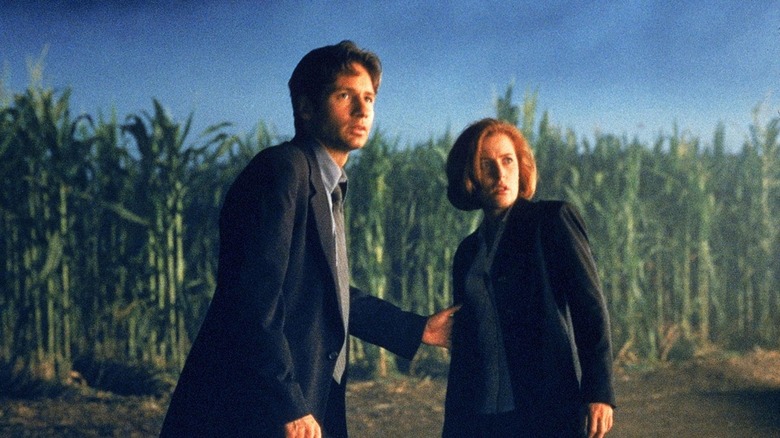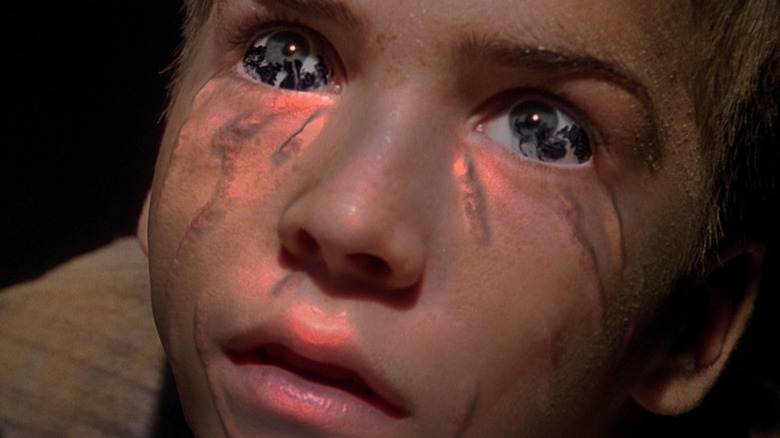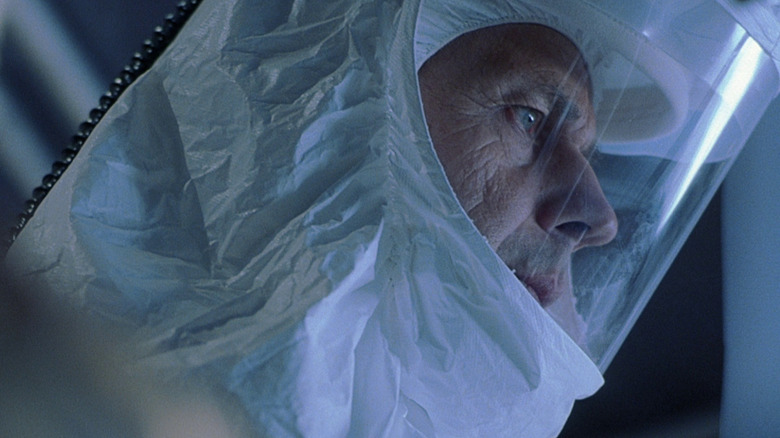The Independence Day Easter Egg In The X-Files Movie Explained
It's curious that "The X-Files" has retained any level of popularity as late as 2022, as few pieces of pop media are more deeply rooted in the ethos of the 1990s. "The X-Files," which debuted in September of 1993, took place in an America living through the end of the Cold War and the collapse of "worldwide Communism" as a go-to boogeyman for the U.S. government. Bill Clinton was overseeing an economic boom, and the populace ... became suspicious. A lot of media in the 1990s became very self-aware at this time. None of the old sitcom tropes of nuclear families, nor the old action movie tropes of endless American military might, were functioning any longer, and a lot of films and TV shows began to deconstruct everything. "The Simpsons" and "Married... with Children," which both debuted in the late '80s, were dark mirrors of the typical American sitcom, while action films were occasionally dark or skewed; remember the dank and kinky "Batman Returns?"
Into this world came Chris Carter's "The X-Files," a TV show about how American mistrust — previously reserved for America's perceived enemies — had turned inward. Now it was the American government itself that could not be trusted, as they were keeping secrets about ... well, space aliens, abductions, and other supernatural creatures carefully hidden from the public eye. The conspiracies were no longer in the hands of The Other, but in our own hands, and only Mulder and Scully (David Duchovny and Gillian Anderson) could solve the problem.
"The X-Files" was popular almost right away, and by 1998, while the show was rounding out its fifth season, a feature film was released in theaters. This was an oddity in cinema as the "X-Files" film, also just called "The X-Files," was meant to fit into the broader story arc of the show before it was to return the following season. It was a massive, cross-media effort long before the MCU was a twinkle in Kevin Feige's eye.
Independence Day Was Loved and Hated
Mini-conspiracy: Feige was 20 when "The X-Files" debuted and was attending USC's film school. When "The X-Files" movie was released in theaters, Feige was 25 and was already serving as an assistant to the executive producers of films like "Volcano" and "You've Got Mail." Did Feige — already rising through the Hollywood system — see "The X-Files" in 1998 and internalize the cross-media potential of a massive entertainment franchise, eventually mixing it with his vast knowledge of Marvel comic books, thereby creating the single most financially successful franch—?? I'm going to stop there. I'm bored.
By the time "The X-Files" played in theaters, however, a resurgence of old-world alien invasion flicks had already reared its head. No, not the immensely enjoyable mayhem-fest "Mars Attacks!," but the very serious and boldly lunkheaded antecedent "Independence Day." Some critics have said that Roland Emmerich's 1996 ultra-blockbuster represents a turning point in American mainstream entertainment. The unbinding of special effects — thanks to the increased utilization of CGI — produced a film that was visually exciting, and unbelievably, earnestly stupid. When "Independence Day" was released, it was seen by everyone ... and lambasted widely; an episode of "South Park" said it "sucks ass." Several critics, including Roger Ebert, criticized the film's lack of creativity and Kevin McManus of The Washington Post cited the film's weak human characters and numerous contrivances.
So even while enormous crowds flocked to "Independence Day," just as many people saw it as a clunky, soulless commercial entertainment. And when you could get any number of interesting indie or prestige flicks playing the same year ("Hard Eight," "Hamlet," "Fargo," "Emma," "Bottle Rocket," "Trainspotting," "Secrets & Lies," "Irma Vep," "Lone Star," "Schizopolis," "Bound," and "Waiting for Guffman") it was easy to turn your back on mainstream garbage.
But, y'know, we still went to see it multiple times anyway.
Chris Carter's Opinion
There is a scene in "The X-Files" wherein Agent Mulder, following an unsuccessful attempt to defuse a terrorist's bomb, ends up drinking in a bar. He said the word "s**tstorm," causing fans of the show to wiggle in excitement. Mulder then leaves the bar, heavily intoxicated, and urinates in an alleyway. And wouldn't you know it, he pees right on a tattered movie poster for "Independence Day." The comment was pretty clear: The big dumb Hollywood entertainment about invading aliens is but a churlish urine receptacle when compared to the more serious, real-world problems of government cover-ups and insidious alien viruses.
Of course audiences noticed, and Entertainment Weekly went looking for answers shortly after the film's release. Chris Carter, for his part, played dumb, claiming that the poster was mere set dressing, and it was only a coincidence that Fox Mulder would be seen peeing on it. But "X-Files'" director Rob Bowman was more candid, revealing that Carter hated "Independence Day" and deliberately wanted to include a dig at it in the film. When confronted with Bowman's outing of him, Carter would still not accept whole blame. Yes, Mulder was peeing on "Independence Day," but if you look closely, he's only peeing next to the poster and not directly on it.
Neither Roland Emmerich nor Dean Devlin, the producer of "Independence Day" commented on the matter.
However diplomatic Carter was in 1998, we know the truth. The truth is out there.


